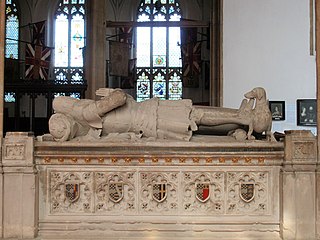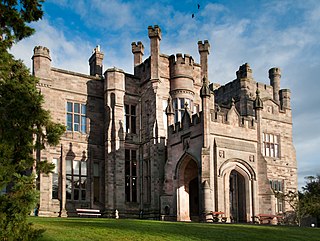Related Research Articles

Edward Jerningham Wakefield, known as Jerningham Wakefield, was the only son of Edward Gibbon Wakefield. As such, he was closely associated with his father's interest in colonisation. He worked for the New Zealand Company and later was a member of the Canterbury Association. He was active as a politician in New Zealand, both at national and provincial level, but became an alcoholic and died penniless in an old people's home.

Baron Stafford, referring to the town of Stafford, is a title that has been created several times in the Peerage of England. In the 14th century, the barons of the first creation were made earls. Those of the fifth creation, in the 17th century, became first viscounts and then earls. Since 1913, the title has been held by the Fitzherbert family.

Costessey is a town and civil parish in the South Norfolk district of Norfolk, England, and is 4 miles (6.4 km) north west of Norwich. The civil parish forms part of the Norwich Urban Area.

Sir Robert Drury was an English knight, Lord of the Manor of Hawstead, Suffolk, and Knight of the Body to Kings Henry VII and Henry VIII. As a politician he was Knight of the Shire for Suffolk, Speaker of the House of Commons, and Privy Councillor. He was also a barrister-at-law. His London townhouse was on the site of today's Drury Lane.
Sir Anthony Kingston was an English royal official, holder of various positions under several Tudor monarchs.

Sir Hubert Edward Henry Jerningham, was a British Liberal Party politician and Governor of Mauritius 1892–1897, then Governor of Trinidad and Tobago between 1897 and 1900.
Melbourne Street is a street situated in the Adelaide suburb of North Adelaide, South Australia.
The following lists events that happened during 1879 in New Zealand.
The following lists events that happened during 1820 in New Zealand.

Longridge Towers School is a non-selective co-educational private day school with some boarding provision in the parish of Horncliffe near Berwick-upon-Tweed, Northumberland, England, for children between the ages of three and eighteen.
Francis Edward Fitzherbert-Stafford, 12th Baron Stafford, DSO was an English peer and British Army officer, holding the title Baron Stafford. His lifetime marked the point where the Stafford barony first came into contact with Fitzherbert as a surname.
Mary Scrope was an English courtier. She was the granddaughter of Henry Scrope, 4th Baron Scrope of Bolton, and the sister of Elizabeth Scrope, wife of John de Vere, 13th Earl of Oxford, and Margaret Scrope, wife of Edmund de la Pole, 3rd Duke of Suffolk. She is said to have been in the service at court of King Henry VIII's first four wives. As the wife of Sir William Kingston, Constable of the Tower of London, she was in attendance on Anne Boleyn during the Queen's brief imprisonment in the Tower in May 1536, and both she and her husband were among those who walked with the Queen to the scaffold. By her first husband, Edward Jerningham, she was the mother of Sir Henry Jerningham, whose support helped to place Queen Mary I on the throne of England in 1553, and who became one of Queen Mary's most favoured courtiers.

Henry Valentine Stafford-Jerningham, 9th Baron Stafford DL, known as Henry Jerningham until 1824 and styled The Honourable Henry Stafford-Jerningham between 1824 and 1851, was a British peer and politician.
Christchurch was a parliamentary electorate in Christchurch, New Zealand. It existed three times. Originally it was the Town of Christchurch from 1853 to 1860. From the 1860–1861 election to the 1871 election, it existed as City of Christchurch. It then existed from the 1875–1876 election until the 1881 election. The last period was from the 1890 election to the 1905 election. Since the 1946 election, a similarly named electorate called Christchurch Central has been in existence.

Samuel Paull Andrews was a 19th-century politician in Christchurch, New Zealand. Originally from the Isle of Wight, he was the first working class man to become a Member of Parliament in his chosen country.
The City of Wellington by-election 1858 was a by-election held in the multi-member City of Wellington electorate during the 2nd New Zealand Parliament, on 27 July 1858.
George William Stafford-Jerningham, 8th Baron Stafford, known as Sir George William Jerningham, 7th Baronet from 1809 to 1824, was a British peer who, in 1824, successfully obtained a reversal of the attainder of the barony of Stafford.
Hon. William George Stafford-Jerningham was an English career diplomat.
Hon. Edward Robert Petre of Stapleton Park was an English horse racer and politician.
References
- ↑ Wickham, Michael (Winter 2004–2005). "Religion and Politics" (PDF). Journal of Liberal History. 45: 29. Retrieved 9 October 2015.
- ↑ Craig, F. W. S. (1977). British parliamentary election results 1832–1885 (1 ed.). London: Macmillan. p. 42.